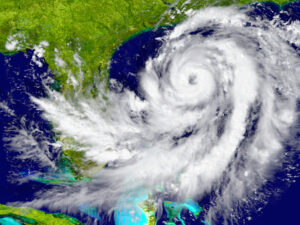Assessing Tropical Storm vS Hurricane Damage
When it comes to assessing damage caused by tropical storms and hurricanes, accredited claims adjusters with training initially from Educational Services & Consulting (ESC) are equipped with the knowledge and skills necessary to differentiate between these two types of weather events and the damages they cause to property.
Understanding the nuances in damage patterns, severity, and the factors that influence these assessments is crucial for providing accurate evaluations and helping policyholders navigate the claims process effectively.
Tropical storms and hurricanes are both powerful weather systems that originate over warm ocean waters, but they differ significantly in terms of their intensity, wind speeds, and the type of damage they can cause.

Tropical Storms typically have sustained wind speeds ranging from 39 to 73 mph. While these storms are less intense than hurricanes, they can still cause substantial damage, particularly through heavy rainfall, flooding, and strong winds. The most common types of damage from tropical storms include roof damage, water intrusion, fallen trees, and minor structural damage to buildings.
Hurricanes, on the other hand, are characterized by sustained winds of 74 mph or higher. The damage from hurricanes can be catastrophic, especially in higher categories (Category 3 and above). Hurricanes bring stronger winds, more significant storm surges, and the potential for widespread flooding and structural damage. Roofs may be completely torn off, homes can be flooded beyond repair, and entire communities may be left devastated in the aftermath.
The Role of a Claims Adjuster in Damage Assessment
Accredited claims adjusters are responsible for evaluating the extent of damage caused by these storms and determining the appropriate compensation based on insurance policies.
The complexity of these assessments increases with the severity of the storm, making it imperative for adjusters to have specialized training.
In the aftermath of a tropical storm or hurricane, adjusters must:
1. Conduct Detailed Inspections: Adjusters perform thorough inspections of affected properties, documenting the extent of the damage. This includes assessing structural integrity, water damage, and the impact of wind and debris.
2. Distinguish Between Wind and Water Damage: One of the critical challenges in storm damage assessment is differentiating between wind and water damage, especially in areas prone to flooding. Insurance policies often cover wind damage but may exclude or limit coverage for water damage, making this distinction crucial.
3. Evaluate Long-Term Impacts: Hurricanes, in particular, can cause damage that isn’t immediately apparent, such as mold growth or foundation issues due to prolonged exposure to water. Adjusters must consider both immediate and long-term damage when making their assessments.
4. Navigate Complex Policy Terms: Understanding the distinctions of insurance policies is vital. Adjusters must interpret policy language accurately to determine coverage limits, exclusions, and endorsements that may apply to a particular claim.
5. Communicate with Policyholders: Effective communication is essential in helping policyholders understand the assessment process and what to expect in terms of compensation. Adjusters must explain their findings clearly and provide guidance on the next steps.
Accredited claims adjusters must be equipped with the skills needed to handle the unique challenges posed by tropical storms and hurricanes. Specifically, they need to be skilled in:
1. Weather Pattern Analysis: Adjusters are trained to understand weather patterns and how they influence damage. This knowledge is critical for distinguishing between the types of damage caused by different storms.
2. Damage Identification Techniques: accredited claims adjusters must be familiar with advanced techniques for identifying and categorizing damage. This includes training on how to assess structural damage, identify water intrusion points, and evaluate the impact of wind and debris.
3. Policy Interpretation: A significant part of an accredited claims adjuster’s training focuses on navigating the complexities of insurance policies. This includes understanding the various types of coverage, exclusions, and how to apply them during the assessment process.
4. Field Experience: Nothing can prepare accredited claims adjusters like hands-on experience and opportunities to practice their skills in real-world scenarios. This practical experience is invaluable for building confidence and proficiency in damage assessment.
5. Ethical Considerations: All accredited claims adjusters must have a strong ethical sense. It is critical that adjusters are able to remain impartial and ensure that all assessments are based on factual evidence and aligned with policy terms.
In the wake of a tropical storm or hurricane, the role of an accredited claims adjuster is crucial in helping individuals and communities recover. The differences in damage caused by these storms require a nuanced approach to assessment, and adjusters with initial training from Educational Services & Consulting are well-prepared to meet these challenges. By understanding the specific impacts of tropical storms and hurricanes, and applying their training to accurately assess damage, these professionals play a vital role in the recovery process, ensuring that policyholders receive the compensation they deserve.
For more information on how to earn your 6-20 ACA designation and join this growing field, we invite you to call our Clermont, Florida office at 1-800-309-2549 or read more about the accredited claims adjuster certification process on our website.
Beyond our ACA courses, we have partnerships that allow our students to continue learning the proper ways to handle claims and continue to grow your career.
In Florida, once you earn your 6-20 accredited claims adjuster designation, you can apply to the state for your all-lines adjuster license. This will enable you to work on home insurance claims, auto and RV insurance claims and property insurance claims. You would have the flexibility to work as a staff claims adjuster or an independent insurance adjuster.
Even if you move out of the state of Florida or your practice takes you out of state, Florida has a reciprocity agreement with other states within the U.S. Individuals who obtain their Florida license are eligible to work in 34 of the 37 states across the U.S. that require an adjuster license. Give us a call today, 1-800-309-2549 for more information.
